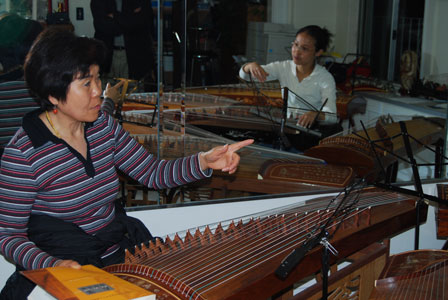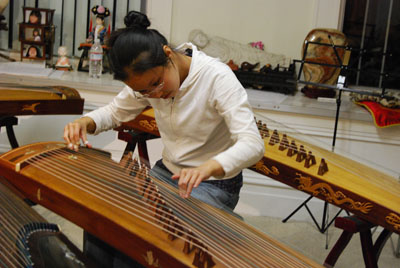 Master musician Weishan Liu’s intimate San Francisco flat teems with Gu Zheng, the classical Chinese zither that originated during the Warring Period over 2,500 years ago, considered to be one of the oldest zithers in the world. They fill her home studio where she conducts classes with many students, young and old, and at times, one or two overflow into an adjacent room by the kitchen, where 15-year old apprentice Regina Ngo occasionally practices long hours while Liu weaves her watchful musical guidance over Ngo with her other daily duties including teaching other students in the front studio, managing daily affairs or cooking a pot of soup from her home. Having worked together for eight years since Regina was introduced to Liu at age seven, the two are current participants in the Alliance’s Apprenticeship Program.
Master musician Weishan Liu’s intimate San Francisco flat teems with Gu Zheng, the classical Chinese zither that originated during the Warring Period over 2,500 years ago, considered to be one of the oldest zithers in the world. They fill her home studio where she conducts classes with many students, young and old, and at times, one or two overflow into an adjacent room by the kitchen, where 15-year old apprentice Regina Ngo occasionally practices long hours while Liu weaves her watchful musical guidance over Ngo with her other daily duties including teaching other students in the front studio, managing daily affairs or cooking a pot of soup from her home. Having worked together for eight years since Regina was introduced to Liu at age seven, the two are current participants in the Alliance’s Apprenticeship Program.
The Gu Zheng’s earliest known versions were constructed with a bamboo frame and silk strings, working off of a pentatonic scale, each major note appointed to one of five strings. It remained popular in the imperial court and the general public through the late Qing Dynasty (1644–1911 AD) during which time musicians began to formalize classical and popular Gu Zheng works through compiling and arranging pieces.
“Because this music is ancient,” Liu explains,”there are very important techniques for Gu Zheng specifically for this style, not learned by reading musical notation.” As part of the apprenticeship, Liu wants to instill in Ngo these techniques, including body positioning, breathing, hand positioning, and knowing when is the right time to perform certain pieces, inclusive of stylistic interpretation and understanding the proper feeling which must be evoked within certain compositions.
Within the course of their work together, Liu gives detailed performance feedback on how to shape the melody and how to vary musical interpretation. Additionally, Liu wants Ngo to begin composing, and, according to Liu, Ngo is already headed down that path of her own accord. “My pillow plays music,” Ngo says as she describes how she always keeps paper and pen handy bedside to jot down original compositions which emerge from her dreamtime. Liu sees the importance of composing as part of their apprenticeship because it enables Ngo to learn how to express images and feelings, and how to evoke images through music, while maintaining a traditional musical base. The importance of composition also emerges from the development of improvisation skills. Ngo notes that “[Liu] tells me how to improvise by using my imagination, thinking about what I should feel, how the piece should sound like. It has to be a balance between what sounds right for me and what sounds right for the audience.”
Liu adds: “If I don’t teach my students how to arrange, they don’t go anywhere, don’t go too far, don’t improve too much. If you don’t teach them how to really do some creative work by themselves from themselves, they don’t really learn. If they learn how to compose and arrange they have a bigger musical growth, not just learn to follow or copy someone else. They have creative work.”
Ngo focused on several existing compositions to improve her skill in Gu Zheng, ranging from the traditional piece Embroidering the Golden Banner which garnered Ngo a gold prize, to contemporary composer Jian Min Wang’s demanding piece Fantasia. Of the different styles of Gu Zheng music Regina has been exposed to in seven years, she prefers the traditional music because, she states, “without traditional music, there would not be modern music. I am interested in the ancient music for the Gu Zheng. It is very old, and a very deep part of Chinese music’s history. I want to understand this style of music so I have better understanding of my Chinese culture and history.”
 As a student of Liu’s however, Ngo is being exposed to the other spectrum of Gu Zheng music. Liu deliberately describes what she teaches as “70% traditional” because she “does not want to stay traditional all the time.” She wants to teach Ngo how to compose based on traditional principles, with indubitable “traditional classical taste,” yet insists on rigorously asking Ngo: “What do you feel from the tradition? What do you learn by yourself from the tradition?”
As a student of Liu’s however, Ngo is being exposed to the other spectrum of Gu Zheng music. Liu deliberately describes what she teaches as “70% traditional” because she “does not want to stay traditional all the time.” She wants to teach Ngo how to compose based on traditional principles, with indubitable “traditional classical taste,” yet insists on rigorously asking Ngo: “What do you feel from the tradition? What do you learn by yourself from the tradition?”
Apprentice Regina Ngo plays Fantasia, a demanding contemporary composition by Chinese composer Jian Min Wong which requires virtuosic technique, physicality and interpretation due to the piece’s demanding fingerwork, frequent key changes, reintroducing percussive strikes to the Gu Zheng’s body (which was once practiced prior to the establishment of the current classical canon) and a unique fret-tuning configuration. Liu describes the piece as “bringing traditional music up a scale” and she incorporated the piece alongside other traditional pieces as part of the apprenticeship in order to push Ngo further than she has ever gone before in her musicianship.
Fantasia’s complicated key changes and use of bending and striking of the Gu Zheng, was selected as a technical and interpretive challenge to increase Ngo’s playing ability, and “to try something different. I decided to teach her this piece because I know this girl has the potential for this kind of thing, a modern piece based on traditional ideas. It is a big challenge for everybody. I know she can do it. When I asked her to do the piece, she was so happy. The first time she showed me, I could tell that she needed a lot of work, but she wouldn’t let me talk! She said, ‘I know, I know.’ So she spent a lot of time working on the piece, sometimes eight hours at a time.”
Ngo describes the process of tackling the piece as having to comb through every single measure to unpack minute details which Liu would guide her through. To up the ante, Liu also put Ngo into the recording studio for the first time in Ngo’s career in order to develop her skills as a recording artist in order complement her burgeoning career as a performer. And Fantasia was on the set list for the recording. Liu explains the importance for Ngo to record: “You have to give people good quality. You don’t have to be perfect, but almost. You need to be in tune, make no mistakes, have good feelings… there’s lots of pressure, but from recording she will improve a lot.”
Liu herself is no stranger to the studio, having recorded on soundtracks ranging from independent films like Eat a Bowl of Tea to blockbusters like Indiana Jones and the Temple of Doom. Her career began when she was eleven studying at the Shen Yang Music Conservatory under renowned Gu Zheng master Cao Zheng, who was responsible for establishing the first university-level Gu Zheng program in China. For almost 50 years, Liu notes, “hardly a day went by without me doing something related to Gu Zheng.” From performing, to composing and adapting, recording solo albums and soundtracks, teaching students and writing articles on the Gu Zheng, Liu has dedicated her life (and home) to the revered instrument, both before and after she arrived in the United States over 25 years ago. She founded and runs the San Francisco Gu Zheng Music Society and has had fruitful collaborations with artists and groups including producer/composer George Winston, Bay Area Women’s Philharmonic, the Dun Huang Music Ensemble and Earplay
With dedicated support from Ngo’s parents Anthony and Lynn Ngo, Ngo’s learning under Liu has been constant and progressive since 2000, with Ngo as a regular fixture playing amidst the many Gu Zheng that occupy the Liu household. Ngo has performed as a soloist and with Chinese orchestras, occasionally sharing the stage with Liu. Ngo thinks of Liu like a godmother who “teaches everything I know—how to play wonderful music and how to be a better person. I believe that with [her] as my teacher, I can become just as great of a virtuoso as she is.”
In looking forward into the future, she reflects: “I hope that when I go to college, I will take a major in music. After I finish college, I hope that will be good enough to teach my own students so that I can give people the chance that Miss Liu is giving me. What I want to do the most is to introduce Gu Zheng to the world.”
